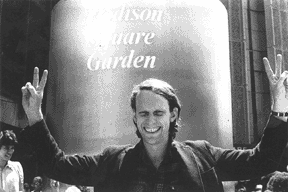Lovejoy's Nuclear War
One of America's most successful documentaries, the story of the earliest major act of civil disobedience against atomic power, and one man's winning fight to warn his community of impending danger
On George Washington's Birthday, February 22nd in 1974, Sam Lovejoy – a 27-year-old farmer – toppled a 500-foot weather tower in Montague, Massachusetts. The tower had been erected by the local utility as part of their attempt to build one of the largest nuclear power plants ever planned.
Leaving 349 feet of twisted wreckage behind, Lovejoy hitched a ride to the local police station, where he turned himself in along with a four-page statement decrying the dangers of nuclear power and accusing the government and utilities of "conspiracy and despotism."
Six months later, Lovejoy stood trial for "willful and malicious destruction of personal property," a five-year felony. He insisted on conducting his own case and told the jury he had acted in self-defense. After a dramatic seven-day trial, Lovejoy went free.

Sam Lovejoy, anti-nuclear tower toppler at home in Montague (above)
"Lovejoy's Nuclear War is a thoroughly absorbing documentary naive enough to seek answers to fundamental questions – namely, the application of civil disobedience to something as complex as the nuclear power issue. The picture is ideally suited to academic and underground showings. . . The viewer is confronted with the kind of knotty public problems that rarely, if ever, get intelligent airing inside a film theater."
-Variety

Lovejoy's Nuclear War has helped spread the story of this remarkable event worldwide, reaching several million viewers since its 1975 release. The film presents a cross-section of views about nuclear power, civil disobedience, and the politics of energy that were drawn together by Lovejoy's sabotage and the trial that followed it. Step by step, it traces the path left by the shock wave of the falling tower: from the streets of this small Connecticut River Valley town to the marble hallways of the Atomic Energy Commission.
Howard Zinn, professor and widely published historian, who testified at Lovejoy's trial as an expert on the history of civil disobedience.
"The film has a pure, stunning instinct for asking the most fundamental and disturbing questions possible about the intersection between private lives and politics." -Harpers Weekly
"A very thoughtful and provocative account of an original and stubborn one-man war against nuclear power. Muted and underplayed, it is one of the few genuinely consciousness-changing and organically political films of the last few years. Both sides are heard, fairly; yet the filmmakers' sympathies are clear."-Amos Vogel, Film Comment
"Supported by a good use of film technique, the movie is excellent for public library film programs and for use in senior high school and college social studies, current events, and political science classes."-American Library Association's Booklist
". . . a warmly human chronicle of a serious 20th century dilemma. Even those who oppose Lovejoy's methods will find the questions it raises both provocative and disturbing."-San Francisco Examiner
"A good film."-M. Ernst, U.S. Nuclear Regulatory Commission
"Sam Lovejoy's battle against the Montague nuclear plant can still be scored a win, for the plant has not been built. The film continues to offer inspiration and hope."-Jana Varlejs, Wilson Library Bulletin
". . . a thoughtful, stimulating discussion of the impact of science on the necessities and quality of life. The message from this movie should not be taken lightly." -S.A. Clough, American Journal of Physics
". . . an informative, persuasive, and remarkably entertaining film" -Cineaste

Chicago International Film Festival 1975 Silver Hugo
American Film Festival 1976 John Grierson Award Red Ribbon
Ann Arbor Film Festival 1976 American Tour
San Francisco International Film Festival 1975 Best Political Film
Berlin Film Festival 1976 American Representative
Midwest Film Conference 1976

Sam Lovejoy, five years after the tower toppled. He is seen here in his role as President of MUSE (Musicians United for Safe Energy), where he helped organize the five-night Madison Square Garden Benefit Concerts for a Non-Nuclear Future. The event was captured and released as a record (now a CD), and a feature movie called No Nukes. Sam is now a lawyer who practices in western Massachusetts and New York City.